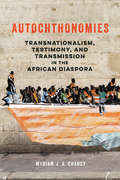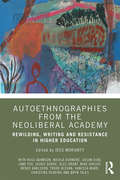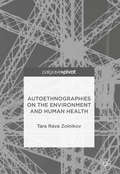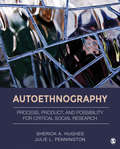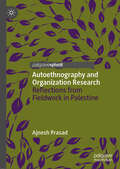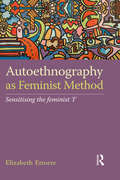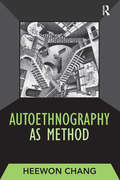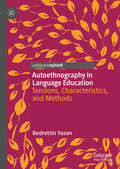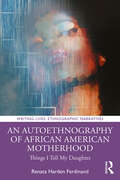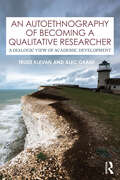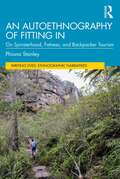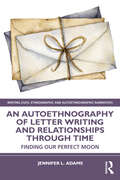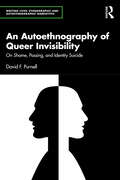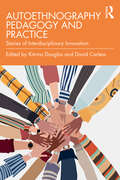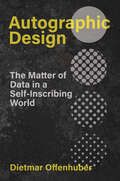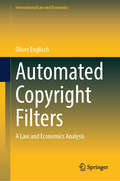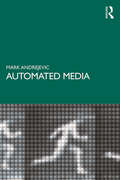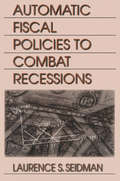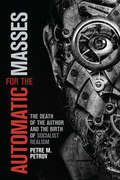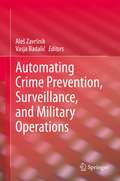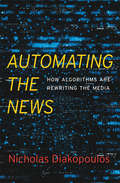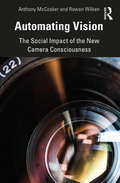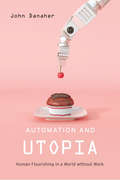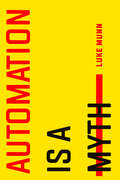- Table View
- List View
Autochthonomies: Transnationalism, Testimony, and Transmission in the African Diaspora (New Black Studies Series)
by Myriam ChancyIn Autochthonomies, Myriam J. A. Chancy engages readers in an interpretive journey. She lays out a radical new process that invites readers to see creations by artists of African descent as legible within the context of African diasporic historical and cultural debates. By invoking a transnational African/diasporic lens and negotiating it through a lakou or ”yard space,” we can see such identities transfigured, recognized, and exchanged. Chancy demonstrates how the process can examine the salient features of texts and art that underscore African/diasporic sensibilities and render them legible. What emerges is a potential for richer readings of African diasporic works that also ruptures the Manichean binary dynamics that have dominated previous interpretations of the material. The result: an enriching interpretive mode focused on the transnational connections between subjects of African descent as the central pole for reader investigation. A bold challenge to established scholarship, Autochthonomies ranges from Africa to Europe and the Americas to provide powerful new tools for charting the transnational interactions between African cultural producers and sites.
Autoethnographies from the Neoliberal Academy: Rewilding, Writing and Resistance in Higher Education
by Jess MoriartyThe shift to a neoliberal agenda has, for many academics, intensified the pressure and undermined the pleasure that their work can and does bring. This book contains stories from a range of autoethnographers seeking to challenge traditional academic discourse by providing personal and evocative writings that detail moments of profound transformation and change. The book focuses on the experiences of one academic and the stories that her dialogues with other autoethnographers generated in response to the neoliberal shift in higher education. Chapters use a variety of genres to provide an innovative text that identifies strategies to challenge neoliberal governance. Autoethnography is as a methodology that can be used as form of resistance to this cultural shift by exploring effects on individual academic and personal lives. The stories are necessarily emotional, personal, important. It is hoped that they will promote other ways of navigating higher education that do not align with neoliberalism and instead, offer more holistic and human ways of being an academic. This book highlights the impact of neoliberalism on academics’ freedom to teach and think freely. With 40% of academics in the UK considering other forms of employment, this book will be of interest to existing and future academics who want to survive the new environment and maintain their motivation and passion for academic life.
Autoethnographies on the Environment and Human Health
by Tara Rava ZolnikovThis book explores the link between individual lives and significant environmental issues affecting millions of people around the world. Zolnikov offers a novel perspective on the environment and human health through autoethnographic stories. Each chapter includes an overview of an environmental risk factor or issue, such as air quality, accompanied by a reflective personal story. Her experiences were gathered around the world and revolve around immersion into local cultures. Learning about environmental health through this qualitative approach will enable readers to understand how issues in the environment are currently affecting people on an individual basis.
Autoethnography: Process, Product, and Possibility for Critical Social Research
by Sherick A. Hughes Julie L. Pennington2020 Society of Professors of Education Outstanding Book Award winner Autoethnography: Process, Product, and Possibility for Critical Social Research provides a short introduction to the methodological tools and concepts of autoethnography, combining theoretical approaches with practical "how to" information. Written for social science students, teachers, teacher educators, and educational researchers, the text shows readers how autoethnographers collect, analyze, and report data. With its grounding in critical social theory and inclusion of innovative methods, this practical resource will move the field of autoethnography forward.
Autoethnography: Process, Product, and Possibility for Critical Social Research
by Sherick A. Hughes Julie L. Pennington2020 Society of Professors of Education Outstanding Book Award winner Autoethnography: Process, Product, and Possibility for Critical Social Research provides a short introduction to the methodological tools and concepts of autoethnography, combining theoretical approaches with practical "how to" information. Written for social science students, teachers, teacher educators, and educational researchers, the text shows readers how autoethnographers collect, analyze, and report data. With its grounding in critical social theory and inclusion of innovative methods, this practical resource will move the field of autoethnography forward.
Autoethnography and Organization Research: Reflections from Fieldwork in Palestine
by Ajnesh PrasadAs a method for empirical inquiry, autoethnography has gained much purchase among business school academics. This book offers exemplars of how autoethnography can be leveraged to study myriad organization and management phenomena. Drawing on his own fieldwork in Palestine, the author engages with several timely questions including: What are the ethical implications of pursuing organization research at neo-colonial spaces? How should we account for the 'Other' when studying in ideologically fraught sites? And, how should we write so as to capture the spirit of autoethnography? In sum, this seminal text highlights the benefits of autoethnography in business school research.
Autoethnography as Feminist Method: Sensitising the feminist 'I'
by Elizabeth EttorreAutoethnography is an ideal method to study the ‘feminist I’. Through personal stories, the author reflects on how feminists negotiate agency and the effect this has on one's political sensibilities. Speaking about oneself transforms into stories of political responsibility - a key issue for feminists who function as cultural mediators.
Autoethnography as Method (Developing Qualitative Inquiry #1)
by Heewon ChangThis methods book will guide the reader through the process of conducting and producing an autoethnographic study through the understanding of self, other, and culture. Readers will be encouraged to follow hands-on, though not prescriptive, steps in data collection, analysis, and interpretation with self-reflective prewriting exercises and self-narrative writing exercises to produce their own autoethnographic work. Chang offers a variety of techniques for gathering data on the self—from diaries to culture grams to interviews with others—and shows how to transform this information into a study that looks for the connection with others present in a diverse world. She shows how the autoethnographic process promotes self-reflection, understanding of multicultural others, qualitative inquiry, and narrative writing. Samples of published autoethnographies provide exemplars for the novice researcher to follow.
Autoethnography in Language Education: Tensions, Characteristics, and Methods
by Bedrettin YazanThis book presents an exploration of autoethnography in language education research as a qualitative method with the potential to decolonize language education practices and include marginalized scholars in knowledge generation. The author situates the method of autoethnography within the field, arguing that it has taken too long for autoethnography to be considered an established research method in language education in particular and in educational research in general. He then addresses tensions at the macro and micro levels of autoethnography, discusses its characteristics, and describes the processes and procedures involved in conducting autoethnographic research. This book will be of interest to graduate students and scholars in language education and related disciplines such as anthropology, communication studies, sociology, and broader educational research.
An Autoethnography of African American Motherhood: Things I Tell My Daughter (Writing Lives: Ethnographic Narratives)
by Renata Harden FerdinandThis is the first full-length explicitly identified autoethnographic text on African American motherhood. It shows the lived experiences of Black motherhood, when mothering is shaped by race, gender, and class, and mothers must navigate not only their own, but also their children's positions in society. Ferdinand takes an intimate look at her mothering strategies spanning ten years (from 2007 to 2017), preparing her daughter to traverse a racist and sexist society. It is a multi-generational text that blends the author’s experience with that of her own mother, grandmother, and her daughter, to engage in a larger discussion of African American/Black mother/womanhood. It is grounded within Black Feminist Theory, which centers the experiences of Black women within the domains of intersecting oppressions. It is from a very personal position that Ferdinand provides a glimpse into the minutiae of mothering that reveal the everyday intricacies of Black women as mothers. It highlights specific strategies Black mothers use to combat discrimination and oppression, from teaching their children about the n-word to choosing positive representations of Black identity in movies, books, dolls, daycares, elementary schools, and even extra-curricular activities. It shows the impact that stereotypical manifestations of Black femininity have on Black women’s experience of motherhood, and how this affects Black women and girls' understanding of themselves, especially their skin color, body shape, and hair texture. As an interdisciplinary text, this book will be reading for academics and students in a broad range of fields, including Education, African American Studies, Communication Studies, Women Studies, Psychology and Health Studies. It is also a handbook of lived experience for Black mothers, grandmothers, and daughters, and for all mothers, grandmothers, and daughters irrespective of color.
An Autoethnography of Becoming A Qualitative Researcher: A Dialogic View of Academic Development
by Trude Klevan Alec GrantAn Autoethnography of Becoming a Qualitative Researcher chronicles Trude Klevan's personal experiences of her doctoral journey, with Alec Grant as an external academic resource and friend, and her subsequent entry into the neoliberal higher education environment. It gives a personal and intimate view of what it's like to become an academic. This book is constructed as an extended dialogue which frequently utilizes email exchanges as data. Firmly grounded in the epistemic resource of friendship, it tells the story of the authors’ symbiotic academic growth around their critical understanding and knowledge of qualitative inquiry and the purposes of such knowledge. The tale told is of the unfolding of a close and mutually beneficial relationship, entangled within sometimes facilitative, sometimes problematic, environmental contexts. It uses these experiences to describe, explore, and critically interrogate some underlying themes of the philosophies, politics, and practices of qualitative inquiry, and of higher education. Disrupting conventional academic norms through their work, friendship, and correspondence, Trude and Alec offer a critical and epistemological view of what it's like to become a qualitative researcher, and how we can do things differently in higher education. This book is suitable for all researchers and students, their supervisors, mentors, and teachers, and academics of qualitative research and autoethnography, and those interested in critiques of higher education.
An Autoethnography of Fitting In: On Spinsterhood, Fatness, and Backpacker Tourism (Writing Lives: Ethnographic Narratives)
by Phiona StanleyAn Autoethnography of Fitting In: On Spinsterhood, Fatness, and Backpacker Tourism is a feminist narrative about the social rules of obedience and acquiescence to the norm – embodiment, heteronormativity, partnering – and about fitting in, or not, with those narratives. Phiona Stanley explores a period through her twenties and thirties, living and travelling alone, foreign to herself and the countries of her travel in all regards: white, cisgender, sometimes thin, sometimes fat, sometimes partnered. This fascinating volume uses these lived experiences, depicted through first-person narrative storytelling, as a prism through which to understand the subtle, social rules of gendered normative expectations. It draws on contemporary journals, letters, and photos, and features process-oriented sections that focus on the methodological possibilities these offer, and on questions of verisimilitude and subjectivity. Set in the context of transnational work in Qatar, China, and elsewhere, and "road status" as negotiated and performed among long-term backpacker tourists, this book serves as an exemplar of how autoethnography can illuminate socio-cultural normativities and their effects – which are rarely explicit, but which nevertheless have great potential to harm – while problematizing and rethinking the meanings and semantic boundaries of weight, queerness, and (hetero)normativity. Framed through reflexive autoethnography, with a strong focus on ethics and feminist theories, this book will appeal to students and researchers in autoethnography, qualitative methods, and gender and women's studies.
An Autoethnography of Letter Writing and Relationships Through Time: Finding our Perfect Moon (Writing Lives: Ethnographic and Autoethnographic Narratives)
by Jennifer L. AdamsAn Autoethnography of Letter Writing and Relationships Through Time: Finding Our Perfect Moon is about love letters, stories, and the ability of words to bring people together across time and physical space. Weaving together edited and annotated letters between a young couple in the 1930s with interludes of autoethnographic reflection, the book relates the author’s experiences as she has negotiated this project over 20 years. Reading the letters is a sepia-toned window into the very private world of two young, well-educated Jewish-American people who lived their lives against the backdrop of the Jazz Age, the Great Depression, and Prohibition. The author uses reflective autoethnographic interludes to tell the story of finding the letters and to explore the significance of letters as a communicative genre. Adams considers the ethical implications of being a researcher eavesdropping on private moments in others' lives, and she explores the function of dialogue in the development of the romantic relationship that unfolds in the letters and between the letters and her. The author also advocates for the everyday relational communication practices that collectively comprise life's most important experiences. Students and researchers interested in letter-writing, autoethnography, and relationship development will find relevance in this book. It will also be of value to those interested in letter collections, the ethical implications of intimate research on people from the past who cannot offer consent, the role of nostalgia in interpersonal communication, and anyone who thrills at a love story told from primary documents from the past.
An Autoethnography of Queer Invisibility: On Shame, Passing, and Identity Suicide (Writing Lives: Ethnographic Narratives)
by David PurnellThis book recounts a personal journey of self-acceptance, focusing on the author's creation and reliance of a persona (Paul D. Drevlin) as a defense mechanism against societal and familial pressures.Beginning with a childhood marked by traumatic events, the author begins his desire of invisibility, later adopting the persona of Drevlin to navigate societal expectations and challenges, including his struggles with identity, sexuality, and religious conservatism. This book explores how the persona initially provided protection, safety, and acceptance to eventual self-realization that the persona was more a prisoner than a protector.The aim of this book is to open discussion regarding the shifts in acceptance experienced by the LGBTQ+ community over the years. It underscores the importance of family (whether that be birth family or family of choice) and peer support, community acceptance, and the changing dynamics of LGBTQ+ landscapes. The book also aims to stress the significance of fostering an inclusive society and respecting the diverse identities of individuals, advocating for understanding, empathy, and collective efforts toward equality and acceptance.Suitable for students studying LGBTQ+ studies, gender studies, sociology, psychology, social work, and creative writing, this book will also appeal to non-academic readers who may find the cultural and family themes significant to their own lives.
Autoethnography Pedagogy and Practice: Stories of Interdisciplinary Innovation
by Kitrina Douglas David CarlessAutoethnography Pedagogy and Practice supports and generates new insights into how autoethnography can be taught, supervised and practised by sharing the experiences and reflections of researchers from a wide range of fields and disciplines.An international cast of leading researchers provide practical examples of how autoethnography can be successfully introduced into health and human sciences curricula, showcasing examples of the power of autoethnography within and beyond academia. By privileging contributors’ experiences within their own field of study as students, teachers, supervisors and researchers, this book explores how autoethnography can be introduced, nurtured and sustained in challenging academic environments. Each chapter considers three interrelated areas: Disciplinary Contexts, which examines autoethnography’s impact across different fields; Relationships, which considers how to successfully manage relational and care dynamics from undergraduate through professor levels; and Ethics, which addresses the many ethical considerations that can arise across a wide range of contexts.Autoethnography Pedagogy and Practice is a book that encourages readers to engage in autoethnographic practice to create innovative, dialogical and collaborative texts that push the boundaries of polyvocality and diversity within their own disciplines. It will be of interest to researchers in Psychology, Medicine, Pharmacology, Allied Health, Nursing, Mental health, Sport and Exercise Science, Coaching, Sociology, Psychotherapy, Theatre Studies and Communication Studies.
Autographic Design: The Matter of Data in a Self-Inscribing World (metaLAB Projects)
by Dietmar OffenhuberAn ambitious vision for design based on the premise that data is material, not abstract.Data analysis and visualization are crucial tools in today's society, and digital representations have steadily become the default. Yet, more and more often, we find that citizen scientists, environmental activists, and forensic amateurs are using analog methods to present evidence of pollution, climate change, and the spread of disinformation. In this illuminating book, Dietmar Offenhuber presents a model for these practices, a model to make data generation accountable: autographic design.Autographic refers to the notion that every event inscribes itself in countless ways. Think of a sundial, for example—a perfectly autographic device that displays information on itself. Inspired by such post-digital practices of visualization and evidence construction, Offenhuber describes an approach to visualization based on the premise that data is a material entity rather than an abstract representation. Emerson wrote, &“Every act of the man inscribes itself in the memories of his fellows, and in his own manners and face.&” In Autographic Design, Offenhuber introduces a model for design that emphasizes traces, imprints, and self-inscriptions, turning them into sensory displays.In an age where misinformation is harder and harder to identify, Autographic Design makes an urgent and persuasive case for a different approach that calls attention to the production of data and its connection to the material world.
Automated Copyright Filters: A Law and Economics Analysis (International Law and Economics)
by Oliver EnglischThe automated filtering of upload attempts to online platforms is one of the most contentious issues in the fields of copyright enforcement and platform regulation. Notwithstanding the impassioned debate, research from a law and economics perspective is scarce. This book presents the first comprehensive economic analysis of automated copyright filtering. The author develops an economic model of the competition between right holders and copyright-infringing uploaders on a platform. Furthermore, he applies insights from the economic literature on decision-making under uncertainty and incentive alignment to automated copyright filtering. The analysis disentangles complex relationships and challenges prevailing assumptions. It offers a novel perspective on the implications of automated filtering for the objectives of copyright policy, on the avoidance of erroneous filtering decisions, and on regulatory approaches to automated filtering. The author employs his findings to evaluate the current US and EU legal frameworks and proposes improvements. This book will appeal to researchers and policy makers interested in automated filtering, copyright enforcement, and platform regulation.
Automated Media
by Mark AndrejevicIn this era of pervasive automation, Mark Andrejevic provides an original framework for tracing the logical trajectory of automated media and their social, political, and cultural consequences. This book explores the cascading logic of automation, which develops from the information collection process through to data processing and, finally, automated decision making. It argues that pervasive digital monitoring combines with algorithmic decision making and machine learning to create new forms of power and control that pose challenges to democratic forms of accountability and individual autonomy alike. Andrejevic provides an overview of the implications of these developments for the fate of human experience, describing the "bias of automation" through the logics of pre-emption, operationalism, and "framelessness." Automated Media is a fascinating and groundbreaking new volume: a must-read for students and researchers of critical media studies interested in the intersections of media, technology, and the digital economy.
Automatic Fiscal Policies to Combat Recessions
by Laurence S. SeidmanDrawing on the most prominent research in the field, this timely book offers bold new fiscal policies that can complement current automatic stabilizers and counter-cyclical monetary policy to help combat recessions. Dr. Seidman argues for an independent fiscal policy board or the Federal Reserve to decide changes in the magnitude of Congress's fiscal policy package of stimulus or restraint, with recommendations going into effect immediately, subject only to Congressional override.
Automatic for the Masses
by Petre M. PetrovAt the end of the 1920s, the Modernist and avant-garde artistic programmes of the early Soviet Union were swept away by the rise of Stalinism and the dictates of Socialist Realism. Did this aesthetic transition also constitute a conceptual break, or were there unseen continuities between these two movements? In Automatic for the Masses, Petre M. Petrov offers a novel, theoretically informed account of that transition, tracing those connections through Modernist notions of agency and authorship.Reading the statements and manifestos of the Formalists, Constructivists, and other Soviet avant-garde artists, Petrov argues that Socialist Realism perpetuated in a new form the Modernist "death of the author." In interpreting this symbolic demise, he shows how the official culture of the 1930s can be seen as a perverted realization of modernism's unrealizable project. An insightful and challenging interpretation of the era, Automatic for the Masses will be required reading for those interested in understanding early Soviet culture.
Automating Crime Prevention, Surveillance, and Military Operations
by Aleš Završnik Vasja BadaličThis interdisciplinary volume critically explores how the ever-increasing use of automated systems is changing policing, criminal justice systems, and military operations at the national and international level. The book examines the ways in which automated systems are beneficial to society, while addressing the risks they represent for human rights. This book starts with a historical overview of how different types of knowledge have transformed crime control and the security domain, comparing those epistemological shifts with the current shift caused by knowledge produced with high-tech information technology tools such as big data analytics, machine learning, and artificial intelligence. The first part explores the use of automated systems, such as predictive policing and platform policing, in law enforcement. The second part analyzes the use of automated systems, such as algorithms used in sentencing and parole decisions, in courts of law. The third part examines the use and misuse of automated systems for surveillance and social control. The fourth part discusses the use of lethal (semi)autonomous weapons systems in armed conflicts. An essential read for researchers, politicians, and advocates interested in the use and potential misuse of automated systems in crime control, this diverse volume draws expertise from such fields as criminology, law, sociology, philosophy, and anthropology.
Automating the News: How Algorithms Are Rewriting the Media
by Nicholas DiakopoulosFrom hidden connections in big data to bots spreading fake news, journalism is increasingly computer-generated. Nicholas Diakopoulos explains the present and future of a world in which algorithms have changed how the news is created, disseminated, and received, and he shows why journalists—and their values—are at little risk of being replaced.
Automating Vision: The Social Impact of the New Camera Consciousness
by Anthony McCosker Rowan WilkenAutomating Vision explores the rise of seeing machines through four case studies: facial recognition, drone vision, mobile and locative media and driverless cars. Proposing a conceptual lens of camera consciousness, which is drawn from the early visual anthropology of Gregory Bateson and Margaret Mead, Automating Vision accounts for the growing power and value of camera technologies and digital image processing. Behind the smart camera devices examined throughout the book lies a set of increasingly integrated and automated technologies underpinned by artificial intelligence, machine learning and image processing. Seeing machines are now implicated in growing visual data markets and are supported by emerging layers of infrastructure that they coproduce. In this book, Anthony McCosker and Rowan Wilken address the social impacts, the disruptions and reconfigurations to existing digital media ecosystems, to urban environments and to mobility and social relations that result from the increasing automation of vision and explore how it might be possible to ensure a safe and equitable future as we learn to see with and negotiate the interventions of seeing machines. This book will appeal to students and scholars in media, communication, cultural studies, sociology of media and science and technology studies.
Automation and Utopia: Human Flourishing in a World without Work
by John DanaherAutomating technologies threaten to usher in a workless future, but John Danaher argues that this can be a good thing. A world without work may be a kind of utopia, free of the misery of the job and full of opportunities for creativity and exploration. If we play our cards right, automation could be the path to idealized forms of human flourishing.
Automation Is a Myth
by Luke MunnFor some, automation will usher in a labor-free utopia; for others, it signals a disastrous age-to-come. Yet whether seen as dream or nightmare, automation, argues Munn, is ultimately a fable that rests on a set of triple fictions. There is the myth of full autonomy, claiming that machines will take over production and supplant humans. But far from being self-acting, technical solutions are piecemeal; their support and maintenance reveals the immense human labor behind "autonomous" processes. There is the myth of universal automation, with technologies framed as a desituated force sweeping the globe. But this fiction ignores the social, cultural, and geographical forces that shape technologies at a local level. And, there is the myth of automating everyone, the generic figure of "the human" at the heart of automation claims. But labor is socially stratified and so automation's fallout will be highly uneven, falling heavier on some (immigrants, people of color, women) than others. Munn moves from machine minders in China to warehouse pickers in the United States to explore the ways that new technologies do (and don't) reconfigure labor. Combining this rich array of human stories with insights from media and cultural studies, Munn points to a more nuanced, localized, and racialized understanding of the "future of work."
